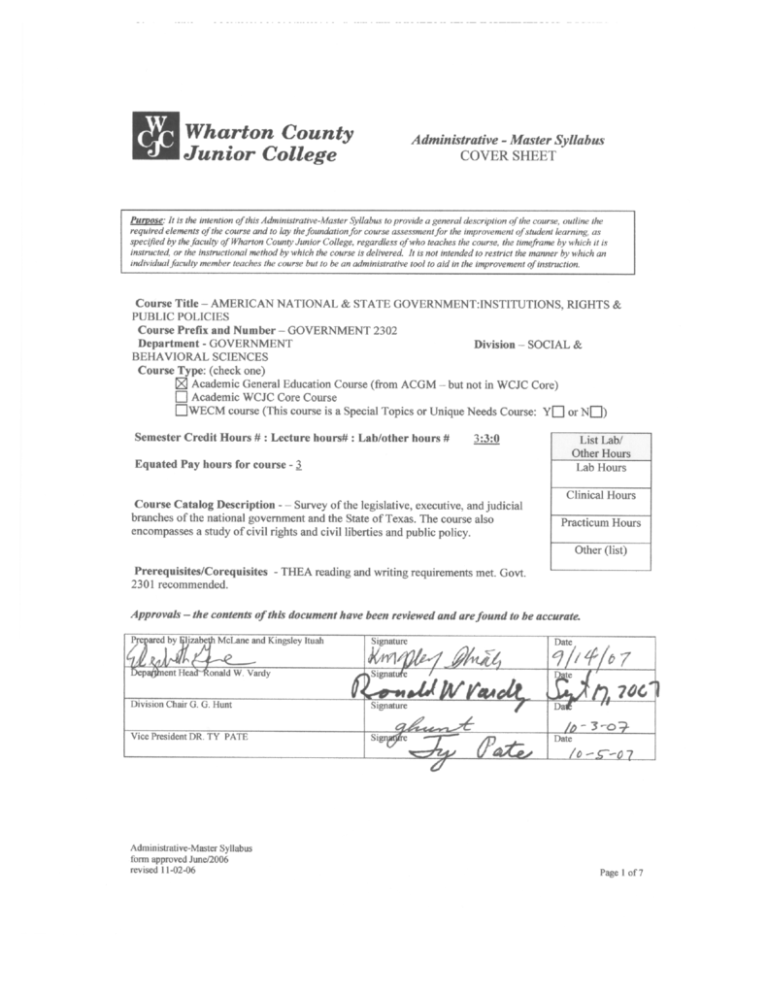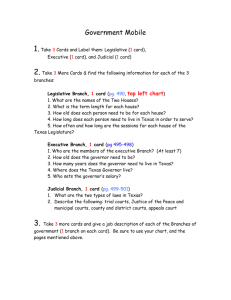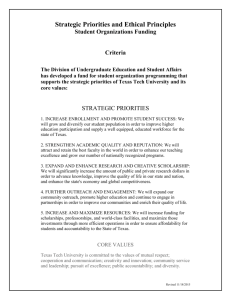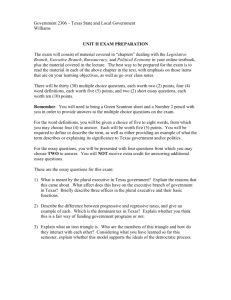GOVT 2302 American National and State Government
advertisement

Administrative-Master Syllabus form approved June/2006 revised 11-02-06 Page 1 of 7 Administrative - Master Syllabus I. Topical Outline – Each offering of this course must include the following topics (be sure to include information regarding lab, practicum, clinical or other non lecture instruction): This class is divided into five primary areas: Area One: Legislative Branch - This area introduces students to the Constitutional backgrounds for Congress and Texas and how Congress and the Texas legislature are organized, their functions and their relationships with the other branches of government. Students will learn about constitutional powers, apportionment, redistricting, House and Senate leaders and members and their respective characteristics, the committee systems, theories of representation, voting cues, support staff/agencies, colleagues and caucuses, interest groups, lobbyists and political action committees, the law making process and the budgeting function. Area Two: Executive Branch - This area provides an overview of presidential and gubernatorial governance and histories of the offices, the constitutional powers of these offices, the bureaucracies that support the presidency and Texas governor , executive policy making and leadership. Students will learn about presidential and gubernatorial qualifications, terms of office, the rules of succession, veto power, the vice president and Texas’ plural executive, the Executive Office of the President (EOP) and White House and gubernatorial staffs, legislative and policy making functions, the importance of personality and the power to persuade, chief executive public opinion and performance evaluation. Area Three: Judicial Branch - This area introduces students to the constitutional and historical development of the federal and state court systems, the American legal system including key law concepts, the organization of federal and state court systems, the process of judicial selection , the current U.S. Supreme Court and both the criminal and civil justice process in Texas. Students will learn about jurisdiction, criminal and civil law, specific original jurisdiction, appellate and specialized courts, justice nomination criteria, how a case goes through the Supreme Court, amicus curiae briefs, judicial philosophy, original intent and the impact of ideology, decision making models, judicial policy making and decision implementation, criticisms and proposed reforms for the Texas judicial system. Area Four: Public Policy - This area examines the historical development, organization, workings and accountability of the federal and state government bureaucracies. Students will learn about the executive branch and the development of federal and Texas state bureaucracy, the spoils and merit system, economic regulation/deregulation, government workplace and political involvement, characteristics of bureaucrats, presidential and gubernatorial appointments, the Cabinet departments and other agencies including key state agencies, the policy making process, rule making, iron triangles, policy networks, rule making, the Sunset process, and control of the bureaucracy by the three branches of government. Additionally, students will learn about the roots of social welfare policy and those policies today, the roots of government involvement in stabilizing the economy, environmental regulation, the history of U.S. foreign and defense policy, the United States as a world power, the executive branch and foreign policy making and the groups that influence that policy, 21st century challenges and building a grand strategy for the new century. Area Five: Civil Liberties and Civil Rights - This area introduces the Bill of Rights, the First Amendment guarantees, the additional amendments, the rights of criminal defendants, the right to privacy concept, the historical struggle regarding slavery, abolition and the right to vote, African American and women’s civil rights movements, the Civil Rights Act of 1964, the civil rights movements of numerous groups and other continuing controversies in civil rights. Administrative-Master Syllabus form approved June/2006 revised 11-02-06 Page 2 of 7 Students will learn about the incorporation doctrine, the establishment clause, the free exercise clause, types of speech, the second amendment, searches and seizures, self-incrimination, exclusionary rule, right to counsel, rights to jury trials, cruel and unusual punishment, the Civil War amendments, key civil rights groups, civil rights litigation, the equal protection clause, statutory remedies and affirmative action. II. Course Learning Outcomes Course Learning Outcome 1. Describe and understand the structure, powers and operations of the United States Congress. 2. Describe and understand the structure, powers and operations of the Texas legislature. 3. Describe and understand the institution, powers and roles of the U.S. President. 4. Describe and understand the institution, powers and roles of the Texas Governor. 5. Describe and explain the structure and operations of the national judicial system and as well the role of different types of law (criminal, civil, public) in society. 6. Describe and explain the structure and operations of the (Texas) judicial system. 7. Describe and understand the scope, powers and operations of the federal bureaucracy. 8. Describe and understand the scope, powers and operations of the state (Texas) bureaucracy. 9. Explain the public policy process. 10. Introduce and analyze public policy issues including but not limited to social welfare policy, economic policy and foreign/defense policy at the national, state and local levels. 11. Analyze and discuss issues relating to civil liberties and civil rights including First Amendment freedoms and procedural and substantive due processes. Method of Assessment Outcomes one through twelve are incorporated into the PreTest and Post-Test and will also be covered by instructors on unit tests and out of class assignments. These core areas arelso covered in the assigned text. 1. Written projects and oral presentations as assigned by the instructor. 2. Measured by written assignments, class discussions and examination scores. 3. Measured by the Post-test, critical thinking exercises and oral presentations. 12. Identify and analyze the importance of ethics in government and public policy. III. Required Text(s), Optional Text(s) and/or Materials to be Supplied by Student. Politics in America (Texas Edition); Thomas Dye; Pearson Publishing 2009; ISBN 0558217672 IV. Suggested Course Maximum - 35 V. List any specific spatial or physical requirements beyond a typical classroom required to teach the course. No special requirements for face-to-face course. Instructor must have access to working computer and all appropriate technology for WWW course as well as courses taught by ITV. VI. Course Requirements/Grading System – Describe any course specific requirements such as research papers or reading assignments and the generalized grading format for the course The government courses require significant written effort. This written component may include any of or a combination of the following: research paper, oral presentation, special projects dealing with interest groups, bills in Congress or political parties for example. Reading assignments come primarily from the assigned text but is not limited to the text. It may include articles from newspapers, academic journals or web assigned readings. The generalized grading system for the course is the commonly practiced collegiate level letter grade final course evaluation, A through F, 90 to 100 for an A and so forth. VII. Curriculum Checklist Administrative-Master Syllabus form approved June/2006 revised 11-02-06 Page 3 of 7 - Academic General Education Course (from ACGM – but not in WCJC Core) No additional documentation needed - Academic WCJC Core Course Attach the Core Curriculum Checklist, including the following: Basic Intellectual Competencies Perspectives Exemplary Educational Objectives - WECM Courses Attach the following: Program SCANS Matrix Course SCANS Competencies Checklist Administrative-Master Syllabus form approved June/2006 revised 11-02-06 Page 4 of 7 Core Curriculum Checklist Page 1: Competencies Course Prefix & Number: GOVT 2302 Component Area for this Course: Social & Behavioral Sciences Intellectual Competencies for this course: Reading, Listening, Critical Thinking Competency Method of Assessment READING: Reading at the college level means the ability to analyze and Essay questions on exams, writing of critical thinking papers and interpret a variety of printed materials – books, articles, and documents. or other writing assignments demonstrating basic knowledge of key areas of the institutions and processes of government. WRITING: Competency in writing is the ability to produce clear, correct, and coherent prose adapted to purpose, occasion, and audience. Student research papers and or other projects reflecting individual research, adequately researched, logically presented and documented within academically acceptable standards directed at the appropriate audience. CRITICAL THINKING: Critical thinking embraces methods for applying Completion of independently researched papers pertaining the both qualitative and quantitative skills analytically and creatively to subject various institutions of government, including student analysis, matter in order to evaluate arguments and to construct alternative offering their own opinion supported by competent research from strategies. academically acceptable sources at collegiate level. COMPUTER LITERACY: Computer literacy at the college level means the ability to use computer-based technology in communicating, solving problems, and acquiring information. Core Curriculum Check List Revised June, 2006 Web based research and or processing class assignments via web based courses which primarily is based on word processing computer programs and various search engines and data bases. Page 5 of 7 Core Curriculum Checklist Page 2: Perspectives Course Prefix & Number: GOVT 2302 Perspective Method of Assessment 1. Establish broad and multiple perspectives of the individual in relationship to the larger society and world in which he or she lives, and help the student to understand the responsibilities of living in a culturallyand ethically-diversified world; 2. Stimulate a capacity to discuss and reflect upon individual, political, Independent research projects, voting and civic participation, in economic, and social aspects of life to understand ways to be a class positions of various aspects of government and its responsible member of society; institutions and how it directly or indirectly effects individual students on a daily basis. 3. Recognize the importance of maintaining health and wellness; 4. Develop a capacity to use knowledge of how technology and science affect lives; 5. Develop personal values for ethical behavior; 6. Develop the ability to make aesthetic judgments; 7. Use logical reasoning in problem solving; Quizzes and test questions. Students will analyze voting and other graphical and tabular data to explain different results and outcomes across a variety of parameters. 8. Integrate knowledge and understanding of the interrelationships of the scholarly disciplines Core Curriculum Check List Revised June, 2006 Page 6 of 7 Core Curriculum Checklist Page 3: Exemplary Educational Objectives Course Prefix & Number: GOVT 2302 Component Area: Social and Behavioral Sciences Exemplary Educational Objective Method of Assessment 1. Employ the appropriate methods, technologies, and data that social and behavioral scientists use to investigate the human condition. 2. Examine social institutions and processes across a range of historical periods, social structures, and cultures. 3. Use and critique alternative explanatory systems or theories. Questions on quizzes and exams plus class discussion regarding the various competing theories and forms of government and approaches to public policy. 4. Develop and communicate alternative explanations or solutions for contemporary social issues. 5. Analyze the effects of historical, social, political, economic, cultural, and global forces on the area under study. Questions on quizzes and exams plus class discussion regarding the various domestic forces such as interest groups and political parties that have impact on the American polity. 6. Comprehend the origins and evolution of U.S. and Texas political systems, with a focus on the growth of political institutions, the constitutions of the U.S. and Texas, federalism, civil liberties, and civil and human rights. Questions on quizzes and exams plus class discussion regarding the various competing theories and forms of government and approaches to public policy. 7. Understand the evolution and current role of the U.S. in the world. 8. Differentiate and analyze historical evidence (documentary and statistical) and differing viewpoints. 9. Recognize and apply reasonable criteria for the acceptability of historical evidence and social research. 10. Analyze, critically assess, and develop creative solutions to public policy issues. 11. Recognize and assume one's responsibility as a citizen in a democratic society by learning to think for oneself, by engaging in public discourse, and by obtaining information through the news media and other appropriate information sources about politics and public policy. 12. Identify and understand differences and commonalities within diverse cultures. Core Curriculum Check List Revised June, 2006 Page 7 of 7







